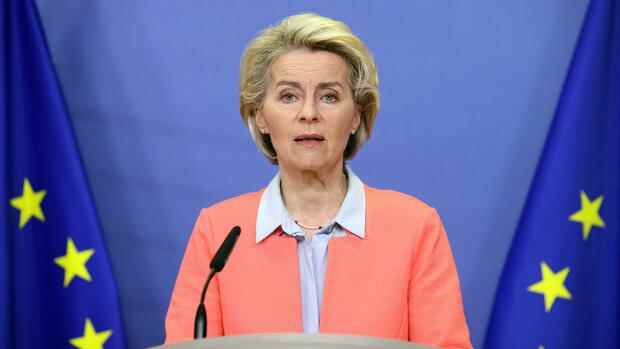The authority of Commission President von der Leyen asks about energy saving potential using an Excel spreadsheet.
(Photo: ddp/abaca press)
Berlin With its goal of reducing dependence on Russian energy supplies as quickly as possible, the EU Commission is relying on support for energy-intensive industry. The Brussels authority’s Directorate-General for Internal Market and Industry has written to companies with high energy consumption and asks them to report any planned projects that can help reduce gas, oil and coal consumption. She wants to get an overview of the potential savings that can be realized quickly.
The query refers to the “REPowerEU” plan, which is intended to help reduce the EU’s demand for Russian natural gas by two-thirds before the end of 2022 and make the EU independent of Russian energy sources well before 2030.
The EU Commission is expecting an answer to its query by Friday, April 1st. An Excel spreadsheet is attached to the letter for the companies to fill out.
In it, they should outline what specific energy-saving measures they are currently planning, what savings in fossil fuels are associated with them and when they can be implemented.
Top jobs of the day
Find the best jobs now and
be notified by email.
According to the letter from the EU Commission to the companies, the aim is to find out which projects are already in the pipeline and could help reduce supply risks at European or national level.
Commission to present plan by May 18th
At their summit in Versailles in the second week of March, the EU heads of state and government instructed the Commission to develop the REPowerEU plan by 18 May. In addition to strengthening Europe’s defense capability, reducing dependence on Russian energy supplies was the second major topic at the summit.
The final paper states that the current situation requires a thorough reassessment of the question of “how we ensure the security of our energy supply”. The aim is to strengthen the EU’s emergency planning for security of supply and to improve energy efficiency and the control of energy consumption.
In addition, the EU countries want to proceed in a coordinated manner when filling the gas storage facilities, optimize the functioning of the electricity market and push ahead with the expansion of the liquefied natural gas (LNG) infrastructure.
Also read on this topic:
The search for potential savings has long since begun in the affected sectors. The question of whether Russia will stop or reduce its deliveries has been discussed for months. In view of the price development on the gas market, many companies with high gas consumption are forced to reduce their consumption as much as possible anyway.
Many companies combine this with technical upgrades and investments in efficiency measures. Industry associations had already offered to explore potential savings in consultation with the Federal Network Agency and the Federal Ministry of Economics.
From the point of view of many companies, the emergency call from Brussels is therefore a signal of helplessness. Gernot-Rüdiger Engel, a lawyer at the Luther law firm who specializes in energy law, takes a critical view of the action: “There is obviously panic at the European Commission when they feel compelled to send out hastily put together Excel spreadsheets,” he said. Apparently the Commission had been caught on the wrong foot.
More: Habeck announces the early warning level of the gas emergency plan.
